Oomska talks to: David Thomson
David Thomson’s ‘New Biographical Dictionary of Film’, now in its 5th edition, was first published in 1975. Since then, it has become universally recognised as a modern classic – a monumental compendium of scholarship, erudition, and incisive criticism.
Interviewed by John Carvill
You’re famous for this book, but you’re also very prolific, aren’t you? In just the last few years, we’ve had ‘The Moment of Psycho’, your memoir, ‘Try To Tell the Story’, a series of ‘Great Stars’ books for Penguin, ‘Have You Seen? (A Personal Introduction to 1,000 Films)’, and now this, the 5th edition of the ‘New Biographical Dictionary of Film’. And that’s saying nothing of all the newspapers and magazines you write for. I wonder, do you ever sleep?
Sleep is a very big issue in my life. I used to think that I slept very little and wrote in all the hours I had available. And there was truth in that. But in the last year I was diagnosed with sleep apnea – which means I kept waking and got very poor, interrupted sleep. So now I am sleeping with an oxygen mask (not pleasant, but you get used to it) and I am getting more and deeper sleep, so that I have more energy. As to writing, it is what I do and what I like to do. In truth, I write a lot more than anyone sees.
The publication of ‘Have You Seen?’ has introduced a fascinating new dynamic to your work. It’s almost impossible now to consider the Biographical Dictionary without ‘Have You Seen?’, even though one is long established while the other is brand new. They seem (to adapt a phrase from John Szarkowski’s classic book on photography, ‘The Photographer’s Eye’) to offer differently angled sectional views through the history of cinema. Is that a fair description?
Yes, very fair. I see them as companion volumes – but not companions who have given up argument and dispute. When I was younger I used to think that opinions, and the right opinions, about films were vital, and fit to go to war over. I now feel opinion is an ocean in which many fish swim. The important thing is just to maintain a lively conversation – and to tell people about films they may not know. There is no such thing as being right. But you can be persuasive.
The Biographical Dictionary has always been full of surprises, hasn’t it? For starters, there’s the surprise – for some, it’s a shock – of discovering all those jokes and trenchant opinions and anecdotes and idiomatic phrases. Some people see the ‘dictionary’ in the title and expect a dry diet of raw facts, don’t they?
I agree, the book is a bit of a trick: I sometimes say it is a very untidy memoir masquerading as a reference book (or even a novel about someone writing a Biographical Dictionary). And I am aware with every new edition that the jokes (or the attempts at them) mount. But that simply reflects my aging need for humor.
It seems to me you’ve always set out to surprise people – to wrong-foot them, shake them up and get them arguing with you. One of the great secondary pleasures of the Biographical Dictionary comes from lending it to, buying it for, or just quoting it at friends and family: they all go through the same process, looking up their favourite actors and directors and quite often finding that what you have to say is sharply divergent from what they expected. This sense of surprise is probably at least half the appeal, and the purpose, would you agree?
I completely agree. The book grew out of teaching experience and I found that I needed to scatter student ideas that I was an authority by saying provocative things that set them arguing. I think almost the best thing about movies is the conversation they prompt.
I think it’s a pity that the book’s original introduction, which was reprinted in the 1994 version, hasn’t been retained in the new edition. There’s a passage from that original introduction which has always stuck with me:
“We all see slightly different films in the cinema, just as we come away from life with discrepant accounts of it. Since film depends upon the loss of fixity that comes with motion it is more prone to opinion than literature, painting, or architecture, where the work will stand still to be inspected.“
That just seems to me to get right to the crux of so many aspects of cinema, many of them paradoxical. Particularly, there’s the fact that cinema is such an inherently communal experience, yet we’re all alone in the dark, watching that screen, having our individual reactions, and forming our own views. Do you think that quality, what you call the “everyone-ness” of cinema, is central to its power and appeal?
Again, I agree. I wish the first intro was in there and if there is a 6th edition – who knows – I will get it in there.
Of course we’re not as often in the dark, or watching a big screen, any more, are we? In the introduction to the 1994 edition, you noted how the nature of watching films has changed: “we watch them now in half-light, on small screens, with life going on around us. The dark itself begins to be archaic.” Since then, the pictures have gotten smaller still, haven’t they? We’ve gone from the cinema to TV and video, to YouTube, and now even to little two inch phone screens. Obviously, quite a bit of the cinematic experience has been lost along the way. Is that process reversible? Is there a market for some sort of retro cinema experience, maybe a regional version of the NFT, showing classic movies on a big screen?
Big question. No, I don’t think technology is reversible – you can’t put the atom bomb back in the bottle, or sound, or even photography, and I know a case can be made against all those tings. So the great need is to preserve and maintain at least a few big screens – museums, maybe, national institutes or a few commercial theatres – where great prints will play large. Of course, the prints are an issue. We live in an age where the people who own films think they’ve done justice to a picture if they make a decent DVD version. They then scrap the prints. So the prospects are not cheerful. I think it is the duty of people like us to stress the big screen experience and the photographic quality – but as you say, kids – my kids – are very happy with tiny screens and do not seem to notice electronic, digital imagery. I don’t know an answer though I do believe that nations should keep archives of film as they do of published material. Of course, in an age of budgetary unease the hope is daft. But keep hoping and arguing.
Technology has been very much a two-edged sword, hasn’t it? Special effects have a lot to answer for. I think it was Martin Scorsese who reminded us that “film itself is a special effect”. And I can now log on to ‘YouTube’, type in the search terms “Bogart Big Sleep Dorothy Malone”, and there I am, getting wet in the ACME book store. But this sort of immediate access threatens to dilute the magic that made such scenes worth remembering in the first place. I think that’s part of what you’re getting at, in this new edition’s introduction, when you say that this “infinite openness” makes you wonder whether “people are watching as closely” as they used to?
Your questions are my answers. Yes, I fear that watching closely does not happen as it did once – that is a huge issue and it has to do with modern distraction and multi-tasking. With my kids (16 and 21) I notice the only advantage I have is that I can concentrate longer. As you might guess, the younger generation is not friendly to this charge – in so many ways they are accustomed to being flattered.
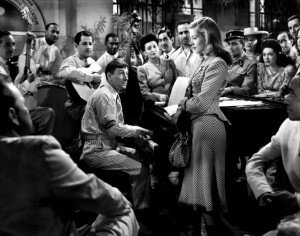
One of the big surprises with this edition of the Biographical Dictionary is right there on the cover. The previous edition’s cover image – from ‘To Have and Have Not’ (1944) – has been superseded by a still from ‘There Will Be Blood’, from 2007. That’s quite a shift. One possible interpretation could be that this very recent film is being held to be as good, and/or as important, as that old Howard Hawks classic starring Bogie and Bacall. If so, that would constitute what Pulp Fiction’s Vincent Vega would call “a bold statement”, wouldn’t it? But then we read in your introduction that you didn’t choose that image yourself – although it comes from a film you’re very fond of.
Well, the cover has developed very gradually. On the first three editions, the jackets were typographical. For 4, Knopf were prepared to dip their toes in the water of illustration. Whereupon I proposed the ‘To Have and Have Not’ still, because I love it and that film and Hawks and because I am fond of merry group shots. It also spoke to my sense of a golden age. Carol Carson at Knopf turned it into a great jacket (and she is a friend who has done many of my jackets). The jacket seemed to work with the public. So for 5, Knopf said “Have you heard about color?” I said I had and I liked it (though not as much as black and white) and I suggested we go for a more recent film this time, just to let younger people think I am not nearly 70 (which I am). I proposed ‘There Will be Blood’ (a favorite from the last few years) and Carol quickly dug up a few stills. She showed me this one and I loved it. No argument. If I had argued I’m sure Knopf would have honored my feelings, but there was no need.
One way to look at that cover is to say, well, film must be in pretty rude health: here’s the new edition of David Thomson’s Biographical Dictionary, and the cover’s got an image on it taken from a film that’s only a few years old. That sort of impression wouldn’t last long though, would it? Your introduction has some fairly gloomy statements in it. It’s “more than obvious”, you say, “that mainstream filmmaking is ebbing away.” Is it wrong to interpret this as a quietly despairing point of view?
Well, yes and no. I love the mainstream – for what it was, for what it meant for my youth, and because I think it embodied a cultural or political hope – that we all might be moved by the same films. Now, that age has passed. And there’s a loss. On the other hand, tougher, more difficult films are made (more or less like novels) – like ‘There Will be Blood’.
Sometimes it seems the story of cinema is one long steady decline. To pick a random statistic, ‘Have You Seen?’ includes 25 films for 1949, and only one (‘Adaptation’) for 2002. That’s some comedown. In the introduction to the 1994 edition of the Biographical Dictionary, you compared the early 1990s to the early 1970s, noting how “the early nineties have not been as encouraging as the early seventies.” The rest of that decade didn’t do much to dispel that impression, did it? Were the 1990s better or worse than the decade that followed?
It’s my view, because of my age – and I’m an old fogey, quite ready to be mocked by kids who think their age is the golden one. Kids should think that. They need the confidence. For myself, I fear that the movies have lost touch with the mass public. But that happy empire existed for only thirty years or so (and it had many negative aspects). Maybe some of us were just damn lucky to be young then. Similarly, I saw Louis Armstrong and Miles Davis live; I saw Dennis Compton and Dennis Law (I hope you can pick up the references).
I can. I’m not a great football or cricket fan, but I do envy you the chance to have seen Armstrong and, particularly, Davis. The best comparison I could offer would be that I once saw Chuck Berry play. Where and when did you see Miles Davis?
He toured England around 1959-60.
Would you class yourself as more of a film critic, or a film historian? Has there been any shift from one to the other over time? I’m thinking maybe, given the current state of cinema, you now regard your work as more historically focused?
I am not a film critic – I’m an historian and a writer about film.
It’s always interesting to see what’s been added in any new edition of the book. But I realised just recently, I’m not sure whether anyone has ever been removed. Have they?
Between editions 1 and 2 a few people were dropped so some could be added. It was a fatuous bargain and I was ashamed of it. So now, if you’re in – I think you’re in for good.
I have to say, looking through the list of new (and updated) entries provided by the publishers, it’s not overly encouraging. I kept waiting for those “ah yes, of course” moments, when the list reminded me of all the great new figures I was forgetting, but they (mostly) never came. A lot of the new names aren’t very inspiring. Someone like Judd Apatow, for instance, undoubtedly justifies inclusion due to his success and status, but he seems such a slight figure.
Well, I have to agree. In the new entries, I probably had more fun and enthusiasm doing “old” ones – people who might have been in a long time ago. But there are a few people I feel very strong about – Audiard, Sarah Polley, Michael Sheen – and others.
Two interesting directors who have emerged relatively recently, and who appear right next to one another near the start of the book, are Paul Thomas Anderson and Wes Anderson. Of these two, you seem very keen on Paul Thomas, and sceptical going on dismissive of Wes. I felt that ‘Magnolia’ was just a poor man’s ‘Short Cuts’. Everybody raves about the dialogue in ‘Boogie Nights’, but it bored me to tears! Maybe I need to watch those films again?
Maybe you do, but maybe I need to look at Wes more. I think very highly of PTA and it’s a great subject for argument. It would make a good seminar – examining the two of them.
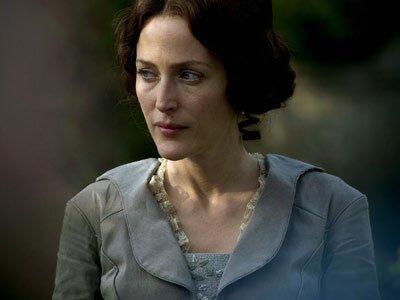
One more Anderson while we’re at it: I was expecting more of a mention of Gillian Anderson’s performance in ‘Bleak House’. For anyone who only half-knew her as “the X Files star”, that was a revelation, wasn’t it?
You are spot on. I love Gillian Anderson – I love the Davies film. I should have raved about her more.
One of the great strengths of the Biographical Dictionary is that it’s a book with which the reader enjoys an evolving relationship. You discover it, and rediscover it, over the years. One of the nicest surprises for the new reader is that they don’t always find all you have to say about someone collected under that person’s own entry. For instance: there’s a lot of great stuff on Orson Welles under his own name, of course, but there’s a good deal more about Welles, and ‘Citizen Kane’, under Everett Sloane.
Similarly, in this new edition, some of the most important points you make about Penelope Cruz are found in the entry for her great admirer and collaborator, director Pedro Almodovar; for instance, where you call Cruz “an actress in the class of Loren or Moreau.”
Cruz is sensational. And she can lift a bad film. I hope she will go on an on.
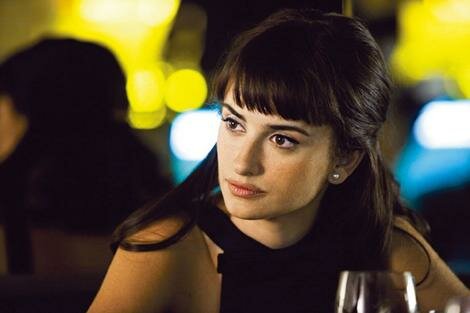
Would you include ‘Elegy’ in that category? That was a puzzling film, I don’t think it really gelled. But it had great performances in it, didn’t it: from Cruz, Ben Kingsley, and Dennis Hopper. Sad to see Hopper go, wasn’t it?
I liked Elegy very much. I think Dennis Hoppe was a legend in his own mind – but not in many other places.
Almodovar seems to promise a lot for the future, doesn’t he?
Almodovar – has he peaked? I wonder. Is he a major figure? Yes.
Alphabetically, that’s taken us past Woody Allen, who I’d love to hear you discuss in more detail some time. You seem a bit harsh in your judgement of Woody. Let me just quickly enter a plea for three of his films: ‘Annie Hall’, which is surely his best and most lastingly enjoyable; ‘Hannah and her Sisters’, that mid-period ensemble masterpiece; and ‘Crimes and Misdemeanors’, which I think is the last wholly satisfactory film he’s made. You seem maybe a little ambivalent about ‘Annie Hall’; I notice you are very hard on it in ‘Have You Seen?’, yet you list it as one of his “four brilliant films” here. Are you still undecided about Woody?
Woody Allen is another seminar. On the whole I think he is a huge let-down. The films you name are not my favorites. In a funny way I think he gets stiff and stodgy when he gets most ambitious. But ‘Radio Days’ I love. I dislike him as an actor so much that it ruins a lot of films.
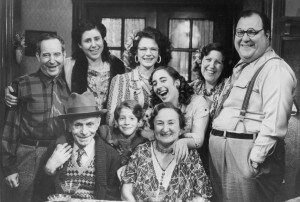
My biggest shock, when I first read your book, came when I looked up my great cinematic hero, Humphrey Bogart. Bogart had his limitations as an actor – although not as many as commonly supposed: Hawks called him “really underrated as an actor”. But as a star, and in terms of being what you call “central to the issue of identification in cinema”, he was pretty much peerless. How different do you think modern cinema would have been if there’d never been a Bogart?
Well, Bogart is a great enabler of noir in that he introduces the gloomy, brooding neurotic hero. The way he shifted from villain to anti-hero is very important and no one else did it in quite the same way. He’s like a few other people of that age – Grant, Stewart, Holden, say – in that he offers a real ambiguity that changes stardom.

The negative aspects some critics find in Wes Anderson’s films – the quirkiness, the pretentiousness, and what we might for want of a better phrase call “a lack of heart” – are also what many decry in the works of the Coen brothers. Again, you often seem ambivalent about the Coens. I cheered from my chair when I read your entry for ‘The Big Lebowski’, in ‘Have You Seen?’ You hailed it as “a key work of late-twentieth-century culture (whereas a lot of more vaunted things aren’t)”, yet here you say that the film “felt too cute by half, like a film watching itself, more intent on being droll than life.” Couldn’t the same be said of Howard Hawks, and ‘The Big Sleep’?
I have liked the Coens a lot more lately (have you seen ‘A Serious Man’?). Lebowski is a film on which I’ve really changed my mind – or seen the light – so you get different comments in different books. Plus I haven’t caught up enough to make them consistent.
Yes. I found ‘A Serious Man’ quietly enjoyable. Better than ‘Burn After Reading’, but not what I would call a return to form. ‘No Country For Old Men’ was great, but to what extent was it really “a Coen Brothers film”?
I liked ‘Burn After Reading’ a lot, and I thought ‘A Serious Man’ was among the best films of the year. As to was it really a Coen Brothers film – I think their work defines what they are.
What do you think the future holds for Leonardo Di Caprio? A lot of Scorsese fans hated him at first. And there’s no doubt that ‘Gangs of New York’ was a disaster. But I would question your claim that he was “struggling” in ‘The Departed’. I thought that was the film where he sort of came of age as an actor. Would you give the acting prize to him or Matt Damon, in that film? What did you make of ‘Shutter Island’?
I fear for DiCaprio. Already I think he’s a lot duller than he was. I shudder to think of another DeNiro story and I don’t think Scorsese is the best handler of actors. I thought Mark Wahlberg was the best thing in ‘The Departed’. I hated ‘Shutter Island’. Yet I liked Leonardo in ‘Inception’. He should do more comedy.
Angie Dickinson’s entry seems particularly calculated to surprise and confound. You say she’s your favourite actress, and I feel confident that you anticipated the chorus of “what about…” that would provoke. On the other hand, I have to thank you for finally persuading me, with all those mentions of it over the years, to forego my aversion to John Wayne and watch ‘Rio Bravo’. What a revelation! I no longer cared about Wayne’s late-period right-wing political views, and although the macho element is unmistakably present, there’s also a fragility, isn’t there?
Well, you got the point – Angie in ‘Rio Bravo’ is so amazing that you’d follow her anywhere.

Michael Douglas has a phenomenal screen presence, doesn’t he? And yet he has not often been in films that have been truly worthy of him. It’s a distressingly common syndrome. How does that happen? I’m thinking also here of Julia Roberts – a wonderful, immensely likable star who has been in mostly awful films. When I read Anthony Lane’s New Yorker profile of Julia Roberts, and he compared her – in this respect – to Ann Sheridan, I had one of those “Aha!” moments – that seems an exactly apt comparison, doesn’t it?
Yes. Julia is a great star – people love when she smiles. It’s as simple as that. And Douglas, I think, is a man who has been too much a multi-tasker. He’s a very good actor, especially with poor material. I have a hunch the older Douglas is going to become a classic – health permitting.
I hope so. Since this latest edition of the Biographical Dictionary was completed, Tony Curtis has passed away. Any thoughts on how Curtis will be remembered?
Curtis will be remembered for a few films as a kind of spiv type who had more ability than he realized.
I think many people’s favourite surprise comes with the entry for Cary Grant, where you suddenly abandon all ambivalence and declare Grant to be “the best and most important actor in the history of cinema”. I still remember the delighted incredulity that statement provoked in me first time round. Over the years, I’ve gradually realised you were right! When did you first form this view of Grant?
Gradually, but key films were ‘Notorious’, ‘North by Northwest’ and ‘People Will Talk’. Above all, ‘His Girl Friday’.
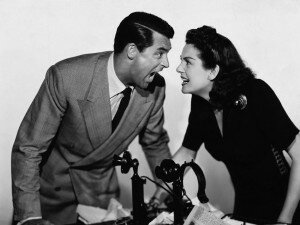
Howard Hawks is a fascinating figure, isn’t he? In a sense, you could call him the Charles Dickens of cinema: scorned for a long time as a maker of “popular entertainment”, and only belatedly admitted to the canon of what’s considered serious art. A very successful and popular director in his time, of course, but somehow absent, as a personality, from the public imagination. I only recently got a copy of Todd McCarthy’s Hawks biography from the publisher, but even an initial browse through reveals a hugely contradictory man. I know you’ve mentioned the McCarthy book once or twice, do you think it got to the heart of Hawks?
I know Todd and like him a lot and I think the book is good, but not quite good enough. Read Slim Hawks’ book – she understood him, loved him and left him. And read my program notes on Hawks for the NFT season coming up in 2011.
I’m very excited to hear there’s a Hawks season coming up at the NFT. I’ve never seen a Hawks film on the big screen, not even my all-time favourite film, ‘The Big Sleep’. Tragic, I know.
You’ve never seen a Hawks movie on a big screen! Fascinating.
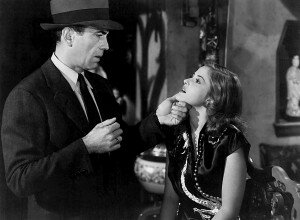
“Timing is everything”, you say, regarding the fact that leaving Scarlett Johansson out of the 2004 edition seemed like an oversight, whereas now she is beginning to look a little less “inevitable”. This made me think of Quentin Tarantino: he didn’t make the cut in 1994; in the 2004 edition you felt the jury was still out on what he would eventually amount to. Now, though, it seems the verdict is in: he’s a busted flush. What happened?
I am sad for Tarantino. He should make comedies.
I used to be a big John Huston fan – mainly because of ‘The Maltese Falcon’, ‘The Treasure of the Sierra Madre’, all those Bogart films – but I gradually realised that, as directors, I preferred both Howard Hawks, and Alfred Hitchcock. And I started to feel a bit queasy about Huston as a person. Would you say John Huston’s place in posterity is still hanging in the balance?
All our places in posterity are hanging in the balance – what else can we expect? Huston was an extraordinary man of many interests – so I think sometimes he was bored with movies. His work is very mixed. As a person, I suspect he had a tough, cruel streak – not a sweetheart. So suppose not all the films are great or good or even decent? There is still The Maltese Falcon, Fat City, Treasure of the Sierra Madre, Beat the Devil.
Anjelica Huston, though, is someone it’s much easier to unequivocally admire, isn’t she? We often say that this or that actor is way out of his or her depth in a certain film; but ‘Prizzi’s Honor’ felt far too shallow to hold Anjelica Huston. ‘The Grifters’ was a better fit, and continues to be a much-neglected film. She’s done some directing recently; do you think she should do more of that, or would that be robbing us of one of our most interesting actresses?
‘The Grifters’ and ‘Pizzi’s Honor’ are wonderful – and she is outstanding in them. I like some of the things she has directed. Yet it’s an unresolved career. The film business doesn’t find her easy to cast. And she hasn’t made enough good films – but that is a recurring lament in the last twenty years or so, and it applies to too many people. Plus it is always tougher for women. She is nearly 60 now – and as you may have noticed there are far more 60-year-old women in life than in our movies.
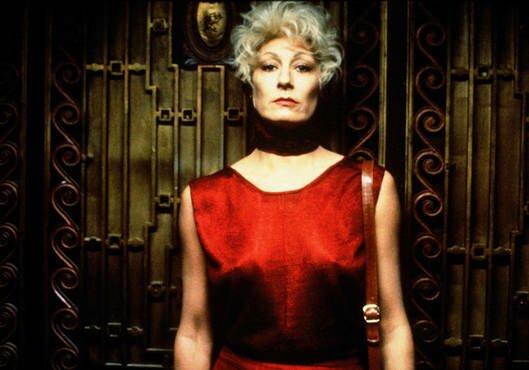
Watching Martin Landau win the Oscar for his portrayal of Bela Lugosi in Tim Burton’s ‘Ed Wood’ was particularly rich for those of us who’ve always enjoyed his role as ‘Leonard’ in ‘North by Northwest’ – a character who lingered on the verge of being a sort of comedy villain. I know you don’t share my admiration for ‘Crimes and Misdemeanours’, but I thought Landau ought to have been given the Oscar for that film. Maybe his performance was too nuanced for the Academy to appreciate?
Well, he’s not exactly a hero of mine. Though many performances are too good for the Academy to notice at the time.
Do you think Michael Mann might be a touch overrated? And how could anybody have made such a dull film of ‘Public Enemies’?
A touch? A bit more than a touch. He has talent, facility, an eye and an ear. I love ‘The Last of the Mohicans’ and I like ‘Heat’ a good deal – though its silliness is plain. But I think he has turned into an inane admirer of fashionably dressed gangsters.
I know you like Jacques Audiard’s ‘The Beat That My Heart Skipped’. Were you as keen on his follow-up, ‘Un Prohphete’? My guess would be that you preferred that to ‘Public Enemy Number One/Killer Instinct’, starring Vincent Cassel?
I liked Prophet very much.
What did you think of Michael Haneke’s ‘Cache’ (Hidden)?
I found it dense and difficult. But I admire Haneke.

Although I’m highly amused by lines such as: “the loveliness of Merchant-Ivory gives me the creeps”, I feel you’re a bit too harsh on ‘Howard’s End’ and ‘The Remains of the Day’. That said, I can’t help agreeing when you say: “The calamity is that ‘Howard’s End’ is better, more sophisticated, and more understanding than Scorsese’s ‘The Age of Innocence’.” To that list, I ask if you would also allow me to add: more moving and – crucially – more enjoyable.
Yes, by all means.

Jack Nicholson is, like Bogart, both ‘an actor’ and ‘a movie star’. Has there been a greater or more beloved screen presence since the golden age? Yet something went wrong, didn’t it? He has done a hell of a lot of rubbish. His fleeting appearance in ‘Broadcast News’ was particularly frustrating – if he’d lingered a little longer he could have stolen that film. What did you make of ‘As Good As It Gets’? I recall feeling grievously insulted by it at the time – the title felt like a taunt – yet a lot of people (the Academy included) seemed to love it.
As you say, Nicholson was and is beloved. But I think he would agree that times have changed and material has diminished. I fear he has lacked the energy or the need to go out and get good material that suits him. So he does what is offered and it’s not good enough. But there was a time when he earned a fortune and that can turn you cynical and self-protective. All too often, film criticism ignores the money. But the case of De Niro’s decline is even more grievous.
Still on Nicholson, did you find some things to like in ‘The Two Jakes’, or was it a total wash-out? Vilmos Zsigmond’s photography was very effective, wasn’t it?
All too few. Vilmos is a great photographer, yet great photography never made a film. But I knew that film when Towne was going to do it – and the loss was great.
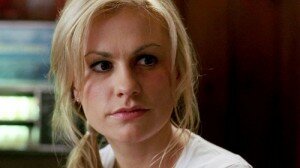
Anna Paquin is another welcome addition to the Biographical Dictionary. I had no idea when I started watching ‘True Blood’ that she was the girl from ‘The Piano’. Her Sookie Stackhouse is one of the best things currently (or recently) on TV, isn’t it? Though I worry that the series will not stand much re-viewing: its appeal relies too much on its immediacy, I think.
Well, a lot of exciting stuff goes stale quickly. But if it works the first time that’s a lot better than not working. Paquin is a great actress. I am struck that you did not know about ‘The Piano’ – a good reason for the Dictionary, just to give the whole picture.
Absolutely, finding things you didn’t go looking for is one of the most pleasurable aspects of the book. I did see ‘The Piano’ at the time, but I didn’t remember Paquin from it.
Walker Percy is another intriguing addition. In his novel, ‘The Moviegoer’, the idea that cinema can, as you put it, “come to loom larger in a person’s internal life than actual experience” is just one strand in a deeply fascinating work; but that idea, and the way Percy handles it, would be reason enough to buy the book. I read somewhere that Tarantino once turned down an offer to direct an adaptation of ‘The Moviegoer’. Lucky escape for Walker Percy! Who do you think could make a worthwhile film of it?
No one.
Would it be fair to say that Miranda Richardson is a national treasure? You mention the fact that many Americans might be surprised to see a lot of her TV work; conversely, many here in the UK know her best for her gleefully unhinged portrayal of Elizabeth I in ‘Blackadder’. I love your description of her as “brilliant, wayward, unpresumptuous, and uncanny.” Could you say more about that?
I adore her – she has just done a strange, intriguing TV series over here called ‘Rubicon’. I think I was trying to say that she usually manages to suggest more than she is showing. She is an international treasure.

You highlight Miranda Richardson’s performance(s) in David Cronenberg’s ‘Spider’, and you include two of Cronenberg’s recent films in ‘Have You Seen?’: ‘A History of Violence’, and ‘Eastern Promises’ I have the feeling that those two films (both of which starred another new addition, Viggo Mortensen) have faded far too fast from the public consciousness, as though they were the works of a much less famous director than Cronenberg. This raises the question of just why some things stick and some don’t. What are your thoughts on this?
I don’t feel those films have faded away, though I dare say Cronenberg is still underrated. On the general point, critical fashion is crazy and foolish and standards are slipping terribly. But, as you know, thee are serious young filmgoers who have never really seen a Hawks film. I’m teasing you, but my point is that education faces a huge uphill slog. On the other hand, nearly everything is now “available” at a certain limited size.
You say Mortensen just needs “one big tragic heroic role to win his Oscar.” Given the nature of the Cormac McCarthy novel – by which I mean its unsuitability for satisfactory cinematic adaptation – we can’t be surprised that ‘The Road’ didn’t give Mortensen that Oscar-winning role. Maybe his next Cronenberg collaboration will?
I hope so. He is a strange man and a very intriguing actor. So few people nowadays have that mystery.
Mark Ruffalo is another new name worth celebrating. He was a revelation in David Fincher’s ‘Zodiac’, wasn’t he? I don’t know what odds William Hill would offer, but it could well be worth backing Ruffalo as an eventual Oscar winner. You seem slightly more cautious, though?
I like him very much, but I detect a certain weakness – passivity. Actors today are on their own and they need to be so strong. Everyone “loves” Johnny Depp, but he drifts along. It is so hard to get good, tough material made. A Ruffalo could end up doing minor films.

I know the subject matter wasn’t exactly miles from his usual territory, but I never would have pegged David Fincher as capable of a film anywhere near as good as ‘Zodiac’. The recreation of period was beautifully done, wasn’t it?
I liked ‘Zodiac’ a lot – and I don’t much like Fincher.
Speaking of Fincher, have you seen ‘The Social Contract’ yet? You’re not on Facebook?
I have seen The Social Network. I was entertained, but I think it’s hollow – don’t see it twice. But once does nicely. Of course, there’s no one to like and the women are scum – it is a Fincher film.
I was delighted to find ‘The Sopranos’ listed in ‘Have You Seen?’, but yet again, you surprised me with your reaction to it. What I fear about ‘True Blood’, you feel is true of ‘The Sopranos’: that in reruns, it “will bore you.” So, you weren’t a fan. But I think you did relish the episode where the junior Mafiosi went to Hollywood and terrorised Ben Kingsley and Lauren Bacall?
I was a fan. I saw nearly every episode. I hope I’m wrong. But I felt that a re-viewing would get monotonous. But I think that’s because TV is all writing and acting – big virtues – but it hardly involves directing.
Good point. I wonder why so many successful TV stars can’t find good film roles? Jennifer Anniston springs to mind.
Because sometimes TV can give you a better role and better money – as well as better material.
While we’re on TV, are you a fan of ‘Mad Men’?
To be honest, I have not seen enough of it – but I think I would be.
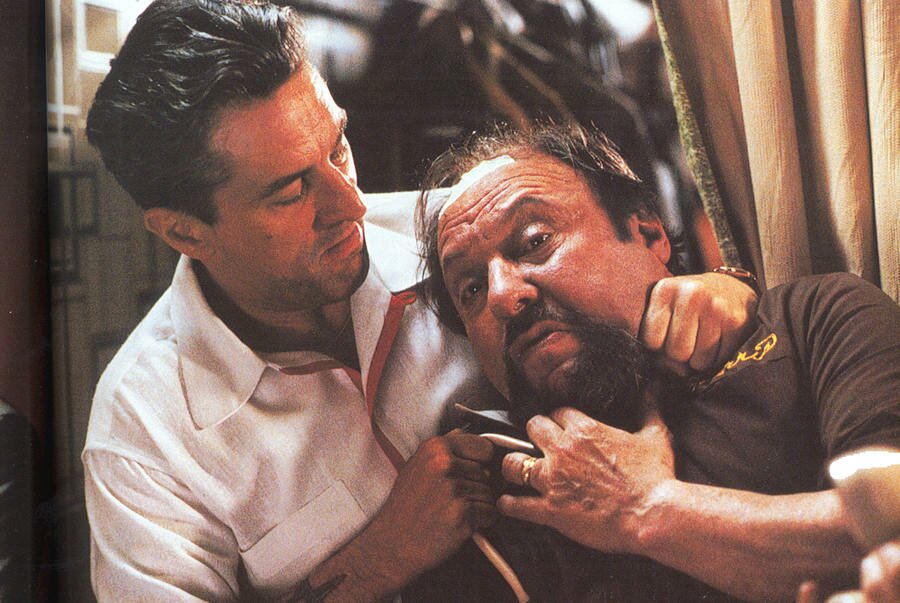
There’s no avoiding Martin Scorsese any longer! We’ve touched on some of his films already, so let me focus on ‘GoodFellas’. Your introduction to that film’s screenplay, published in 1990, was very supportive. You’re now much more equivocal.
I did not do the intro to the film’s screenplay – that was David Thompson.
Oops! Sorry. That’s what I get for working from (faulty) memory.
I think you sum up the misgivings many critics have about ‘GoodFellas’ when you ask, in ‘Have You Seen?’: “Does this film have a secure attitude toward the lives of its guys, or is it giddy with its own ability to ride along in their slipstream?” I would suggest that the answer is: a bit of both. The film gives you the party and the hangover. The film is seductive because the gangster lifestyle is seductive. You know all this, of course.
I think it’s clear that Scorsese enjoys these characters, he even likes some of them some of the time, but he never loses sight of the fact that, in real life, people like Paul Cicero (or Vito Corleone) are, as he himself has put it, “bloodsuckers.” Ultimately, I feel Scorsese is much more condemnatory than celebratory of that lifestyle.
My argument would be that ‘GoodFellas’ is often the victim of a double moral standard when compared with ‘The Godfather’. By which I mean that many critics are markedly more indulgent about the moral ambiguities inherent in ‘The Godfather’, than they are about those present in ‘GoodFellas’. Furthermore, it seems to me that those ambiguities, or to put it another way, those failures to categorically and explicitly assume the moral high ground, are much more acute in ‘The Godfather’ than in Scorsese’s film. Would you agree with that?
I disagree with you on this (not on much): I think Scorsese is helplessly in love with these awful people and unable to extricate himself – or turn to other subjects. On the failure to grasp ambiguities, I think you have a point.
I always had a sort of half-baked theory that ‘GoodFellas’ was in many ways a ‘blue collar’ mob film, compared to the more rarefied world of ‘The Godfather’. Then I read, in The Guardian, your description of ‘The Godfather’ as “a right-wing film”. Could you expand on that? Were you referring to its comparison of the mob to capitalism?
‘The Godfather’ is right-wing because it endorses the family and its business – it actually loves the brutal power it thinks it is attacking – and because it shows no interest in an analysis of the socio-economic roots of crime. It actually brings an intense, glamorous sense of style and majesty to these people – and in that sense you are right: ‘GoodFellas’ knows how squalid they are.
Intriguingly, this edition also contains entries on Joe Kennedy (JFK’s father) and Abraham Zapruder (who filmed the presidential assassination). Those are going to raise a few eyebrows, aren’t they?
Eyebrows are made to be raised.
When you say that Meryl Streep “represents the best we will ever have”, I’m not sure whether to take that statement at face value, or to interpret it as maybe a little bit of a swipe?
No, face value. I have been through the phase of wondering if she was too “technical” – I think she is a great actress, unbelievably skilled – and I find I have come to admire actors who pretend or act more than those who think thy “are” their parts.
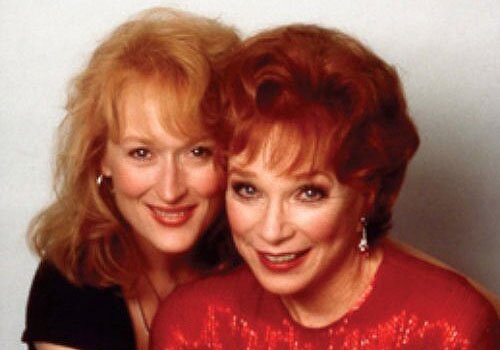
Still on Streep. You describe her as having “made a plunge into comedy little short of disastrous: as the romantic novelist in ‘She-Devil’; as Carrie Fisher’s alter ego in ‘Postcards from the Edge’ […]” I suspect, but I’m not sure, that you are including ‘Postcards’ in that ‘disastrous’ category? I must confess that ‘Postcards’ is my favourite Meryl Streep film. I mean, I like her in pretty much everything, but that performance was so enjoyable, and now seems like a great companion piece for Robert Altman’s ‘The Player’.
Fair enough.
There have been quite a few good British films lately, haven’t there? I know you’re friendly with Stephen Frears, and enjoyed ‘Tamara Drewe’. We’ve also had ‘An Education’, ‘Nowhere Boy’, ‘Made in Dagenham’, and ‘Fish Tank’. Any thoughts on those?
Britain is a fascinating culture – full of talent: Frears, Glazer, Leigh and so on.
The UK Film Council now faces the ‘coalition’ axe. What effect will this have on the future of British film?
I don’t know. I don’t care. Art does not need Councils. It needs imaginations.
Discussing Charlize Theron, you note that: “As with many Oscar winners, her work has not flowered”. Why does this happen? The opposite should be true, surely?
Why?
Well, I suppose I might expect that the Oscar would give the actor a certain amount of confidence, and leeway, to try more interesting roles.
No, the Oscar is a game and a joke – it means nothing.
Building a career – especially for a woman – is so hard. Theron had one amazing part that had Oscar written all over it. But does she want to be “ugly” all her life or does she go back to being beautiful? If the latter, she becomes a leading lady of fair talent likely to be surpassed by younger beauties.
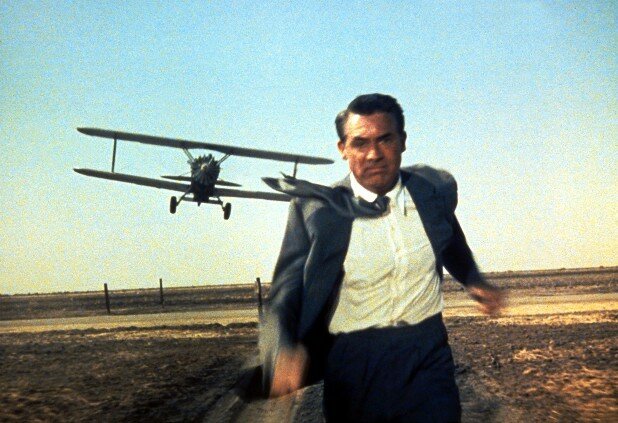
You have a lot of good things to say about ‘Vertigo’, in ‘Have You Seen?’. You even speculate that it might beat ‘Citizen Kane’ to the Number One spot in the 2012 ‘Sight & Sound’ critics’ poll. On the other hand, you feel that ‘North by Northwest’ is “better”. For what it’s worth, I agree; but then “better” is hugely subjective. When and how did ‘Vertigo’ become such a critical favourite?
That’s a long story. When ‘Vertigo’ opened it was a big flop. Then for years it was withdrawn – you could not see it. So it became a legend. Then it came back and was hailed. A great promo job. I admire it – I loved it when I was younger. Now I see the story holes in it and I find it creepy. Whereas ‘Rear Window’ and NNW grow in my esteem.
It’s also extremely stylised, even by Hitchcock’s standards, isn’t it? Also, to the modern eye, it can seem a little slow.
I agree.
We could easily have spent this entire interview discussing Orson Welles. Let me limit this to two questions. Firstly, I wonder why Welles and Bogart never worked together? I’ve read several books about Welles, and pretty much every book available on Bogart, yet they are never mentioned in relation to one another. It’s as though they kept to parallel paths through the same time and place. Can you imagine what a Welles film with Bogart in it would have been like?
I can’t imagine it. Bogey was too tough and direct for Orson. It would have threatened Orson. But Welles didn’t actually like stars too much – you can imagine why – he excelled with supporting actors.
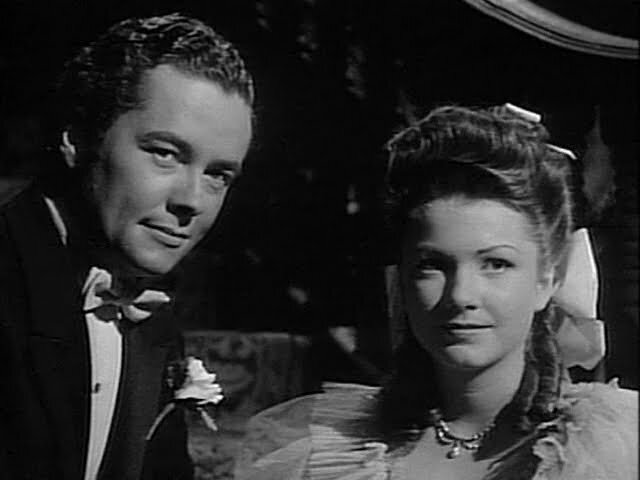
My other Welles question relates to ‘The Magnificent Ambersons’. I love so many Welles films – Kane, of course, but also ‘The Lady From Shanghai’, ‘Touch of Evil’, ‘Journey Into Fear’, ‘The Stranger’, etc. But I only got round to ‘Ambersons’ quite recently and, well, I was just a little bit disappointed. It seemed very, very slow to start, and while it had some of the aspects I love about ‘Citizen Kane’, it certainly didn’t have them all, and those it did have were there in diluted form. Can you understand my reaction?
No. You are too young, You have not lived long enough or had a family or failed at enough things. You have not seen your world fade away. Don’t worry – it will come. So do worry.
I don’t feel too young! But I’ll continue to re-evaluate ‘Ambersons’ as I get older.
No one feels too young but then everyone feels too old.
Where do you stand on the debate surrounding which version of ‘Touch of Evil’ is ‘definitive’?
I prefer the original release.
What do you think of ‘Withnail and I’? I was sorry to see it omitted from ‘Have You Seen?’
I like it – the films not in HYS? are many.
I know you’d be sorely disappointed if I didn’t suggest someone you should have included in the Biographical Dictionary. So, while resisting the urge to make the case for him at length, I’ll simply nominate Bob Dylan, who you do describe as “fancy, odd, and a treat” in your consideration of ‘Pat Garrett and Billy the Kid’.
Good idea.

Your comparison of Reese Witherspoon and Angelina Jolie raises some poignant questions. Jolie seemed a “daring” actress at first, you say, but has now ended up being “as bad as anyone has been” in ‘Salt’. Whereas Witherspoon, in ‘Election’, produced a performance in “the Katherine Hepburn range”. In 1994, you took a punt on Winona Ryder, guessing that she had more chance of becoming an important figure, rather than peers such as Nicole Kidman, Bridget Fonda, Drew Barrymore, Uma Thurman, etc. All of this speaks to the unpredictability of Hollywood careers, doesn’t it?
You said it. Have you read my book on Nicole?
Not yet. I will get round to it eventually. Kidman is another one who can lift a bad film. ‘Australia’ was a mess, but she was very enjoyable in it, wasn’t she? Same goes for Sydney Pollack’s ‘The Interpreter’. Naturally I loved her in ‘To Die For’. Your book took a bit of a critical kicking in some quarters, didn’t it?
It had a lot of bad reviews. But you should read it.

Here’s something, from your entry on Marilyn Monroe, which just might be the most striking passage in the whole book:
“She gave great still. She is funnier in stills, sexier, more mysterious, and protected against being. And still pictures may yet triumph over movies in the history of media. For stills are more available to the imagination.”
Photography is very big today, isn’t it? Still images play a phenomenally important role in our lives. Photography has been called a cross between art and science. I don’t know where that leaves movies? Has photography become more respected as ‘art’ than cinema?
Movie has become so much less visual.
Arguably, cinema increasingly seems to have been very much a 20th Century medium, destined for impermanence. But shouldn’t cinema have been able to draw on certain inherent advantages of its own? I’m thinking of what we discussed earlier, regarding cinema’s lack of “fixity”, and its “everyone-ness”. Didn’t the dynamic, democratic nature of cinema give it a unique power and a vitality that was harder for more rarefied arts – opera, say – to achieve? How did these advantages fail to prevent it from fizzling out?
I’m doing a big book on this now – so I don’t want to get into it here, but I think film is an arc – swiftly rising, then falling.
I look forward to reading that book. Thanks you very much indeed for talking to us.
David Thomson’s ‘New Biographical Dictionary of Film’ is published on 4th November 2010:
‘Have You Seen? (A Personal Introduction to 1,000 Films)’ is now available in paperback:
This interview was conducted via email. As is the case with all oomska interviews, the interviewee was shown a copy of the article prior to publication.
I enjoyed reading your discussion here.
But I am one of those people who loved As Good As It Gets. It’s one of only three movies I’ve paid to see twice at the theatres. Nicholson, Hunt and Kinnar were all fabulous. I know it’s not the Nicholson you loved, but change doesn’t mean decline.
[...] This post was mentioned on Twitter by Sam Price and A Books Blog, The Daily Notebook. The Daily Notebook said: John Carvill interviews David Thomson: http://bit.ly/b1h7zL And reviews his HUMPHREY BOGART: http://bit.ly/asGJNO [...]
I have two editions of the Biographical Dictionary of film. As a lover of the films of the thirties and forties,
I have been disapointed that three of my favorite actors of that period were not included in any editions.
I’m speaking of Lloyd Nolan, Roland Young and Charlie Ruggles.